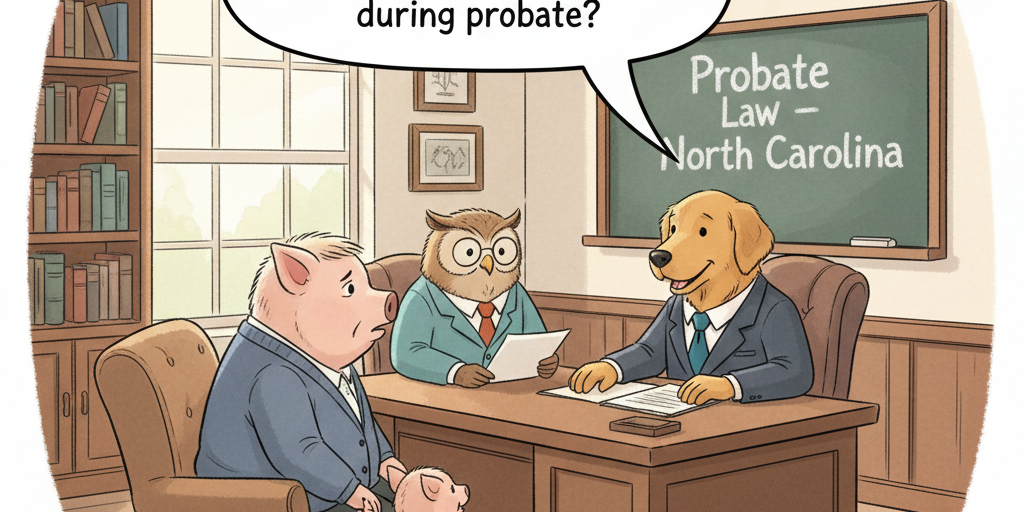What happens to a reverse-mortgaged home titled in both spouses’ names during probate? – North Carolina
Short Answer
In North Carolina, a home titled to both spouses—usually as tenants by the entirety—passes automatically to the surviving spouse and does not go through probate. The reverse mortgage remains a lien on the property. The estate does not automatically pay off that lien unless the law or a valid will requires it. The lender’s “due and payable” timetable depends on the loan documents and whether the surviving spouse is an eligible borrower.
Understanding the Problem
In North Carolina probate, can the administrator or the surviving spouse control what happens to a reverse-mortgaged house titled to both spouses when one spouse dies—and there is no will? Here, a parent has died intestate, and the adult child wants to serve as administrator.
Apply the Law
Under North Carolina law, most married couples hold the home as tenants by the entirety. When one spouse dies, full title vests in the surviving spouse outside probate. A reverse mortgage is a lien (deed of trust) that stays with the property. Unless a valid will directs otherwise or the estate is legally responsible for the underlying debt, the estate does not “exonerate” or pay off that lien; it follows the property. The Clerk of Superior Court (Estates Division) oversees appointment of the administrator and the creditor-claims process, including the notice-to-creditors window, typically 90 days after first publication.
Key Requirements
- Title controls ownership: If the home was titled to both spouses (tenancy by the entirety), it passes to the surviving spouse automatically and is not a probate asset.
- Reverse mortgage remains a lien: The lien stays on the property; the estate does not automatically pay it off absent a legal obligation or will direction.
- Who owes the debt matters: If both spouses were liable on the loan, contribution between the estate and the survivor can arise; if only the decedent was liable, the estate may bear liability up to available assets.
- Administrator’s duties: Gather probate assets, publish and mail notice to creditors, and pay claims by statutory priority; do not treat survivorship property as an estate asset.
- Appointment priority: The surviving spouse has first priority to serve; an adult child can serve if the spouse renounces or the Clerk finds good cause.
What the Statutes Say
- N.C. Gen. Stat. § 28A-4-1 (Appointment priority) – Who the Clerk may appoint and in what order.
- N.C. Gen. Stat. § 28A-14-1 (Notice to creditors) – Publication and notice start the claims window.
- N.C. Gen. Stat. § 28A-19-6 (Order of payment of claims) – Priority for paying allowed claims.
- N.C. Gen. Stat. § 28A-15-3 (Non-exoneration) – Encumbrances generally follow the property unless a will says otherwise.
Analysis
Apply the Rule to the Facts: Because the home was titled to both spouses, title vests in the surviving spouse at death and stays out of probate. The reverse mortgage remains against the property; the estate does not automatically retire it. The adult child can petition to serve as administrator, but the surviving spouse has priority and can renounce to allow the child to serve. The administrator should focus on identifying probate assets (accounts, vehicle, business interests) and addressing creditor claims (medical, IRS) under the statutory order.
Process & Timing
- Who files: Adult child (with spouse’s renunciation if needed). Where: Clerk of Superior Court, Estates Division, in the decedent’s county of domicile. What: Application for Letters of Administration and oath; spouse’s written renunciation if the child is to serve; publish notice to creditors. When: File promptly after death; run notice for four consecutive weeks; creditors typically have 90 days after first publication to present claims.
- Notify the reverse-mortgage servicer of the death and confirm whether the surviving spouse is a borrower and what timelines apply (occupancy, taxes, insurance, and any payoff or sale options). County practices and loan terms can affect timing.
- Collect and liquidate probate assets as needed, pay allowed claims in statutory order, then file a final account with the Clerk. The home remains with the surviving spouse subject to the reverse-mortgage lien unless the spouse sells or pays it off.
Exceptions & Pitfalls
- Title form matters: If the deed isn’t tenancy by the entirety, ownership and probate treatment may differ.
- Who signed the loan: Contribution and estate liability shift depending on whether one or both spouses are obligors.
- Non-exoneration trap: Do not use estate funds to pay off a lien on survivorship property without legal authority or a will directive.
- Notice missteps: Failing to publish and mail notice (including to the IRS if applicable) can keep claims alive and delay closing the estate.
- Control limits: The administrator cannot sell or encumber survivorship property that is not part of the probate estate.
Conclusion
In North Carolina, a reverse-mortgaged home held by both spouses typically bypasses probate and vests in the surviving spouse, with the reverse-mortgage lien still attached. The estate does not automatically pay off that lien; liability depends on who signed the debt and any will direction. To move forward, file an Application for Letters of Administration with the Clerk of Superior Court and promptly publish notice to creditors, then coordinate with the lender about the surviving spouse’s options.
Talk to a Probate Attorney
If you’re dealing with a reverse-mortgaged family home and need to open an intestate estate, our firm has experienced attorneys who can help you understand your options and timelines. Call us today at [919-341-7055].
Disclaimer: This article provides general information about North Carolina law based on the single question stated above. It is not legal advice for your specific situation and does not create an attorney-client relationship. Laws, procedures, and local practice can change and may vary by county. If you have a deadline, act promptly and speak with a licensed North Carolina attorney.


